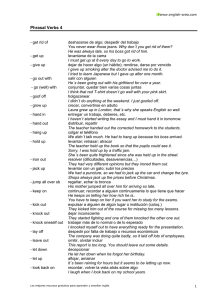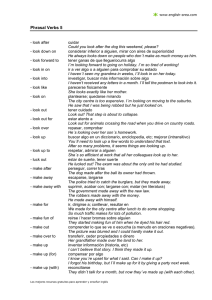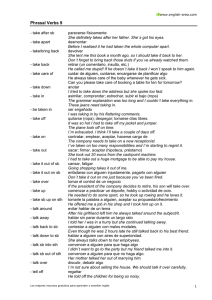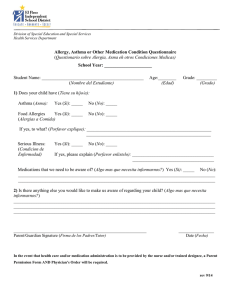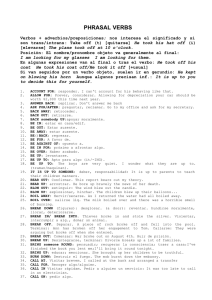PRESENT REPORTING VERB: only pronouns usually need to be
Anuncio
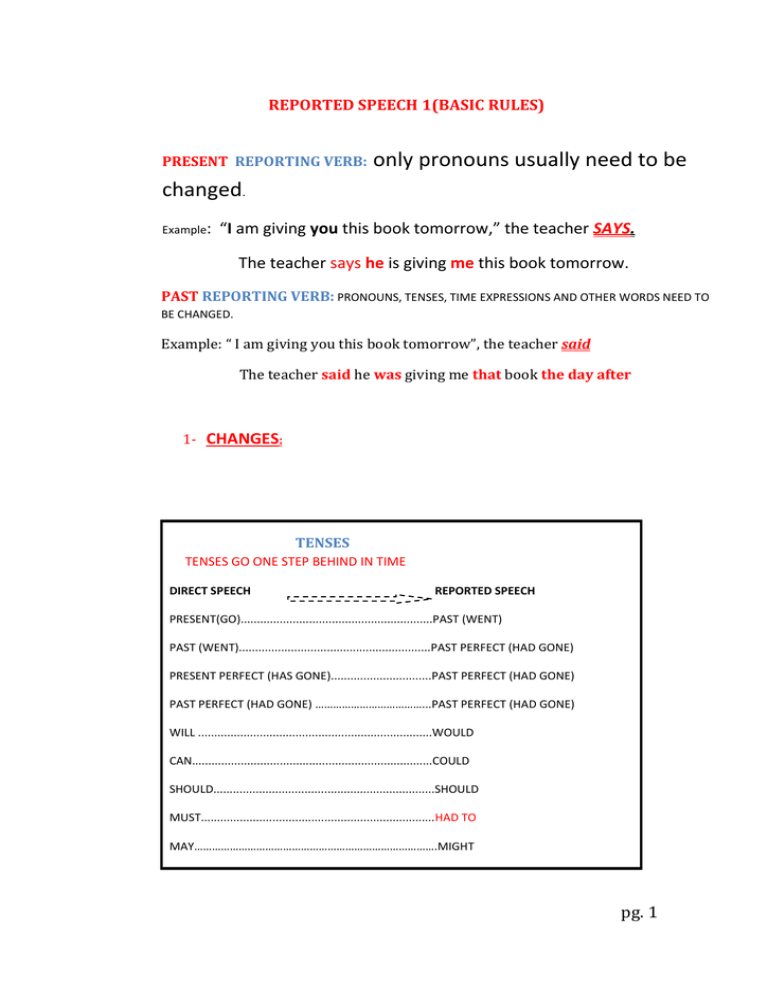
REPORTED SPEECH 1(BASIC RULES) PRESENT REPORTING VERB: only pronouns usually need to be changed. Example: “I am giving you this book tomorrow,” the teacher SAYS. The teacher says he is giving me this book tomorrow. PAST REPORTING VERB: PRONOUNS, TENSES, TIME EXPRESSIONS AND OTHER WORDS NEED TO BE CHANGED. Example: “ I am giving you this book tomorrow”, the teacher said The teacher said he was giving me that book the day after 1- CHANGES: TENSES TENSES GO ONE STEP BEHIND IN TIME DIRECT SPEECH REPORTED SPEECH PRESENT(GO)...........................................................PAST (WENT) PAST (WENT)...........................................................PAST PERFECT (HAD GONE) PRESENT PERFECT (HAS GONE)...............................PAST PERFECT (HAD GONE) PAST PERFECT (HAD GONE) ………………………………...PAST PERFECT (HAD GONE) WILL ........................................................................WOULD CAN..........................................................................COULD SHOULD....................................................................SHOULD MUST........................................................................HAD TO MAY……………………………………………………………………….MIGHT pg. 1 TIME EXPRESSIONS DIRECT SPEECH REPORTED SPEECH NOW..............................................................................THEN TODAY...........................................................................THAT DAY TOMORROW..................................................................THE DAY AFTER YESTERDAY.....................................................................THE DAY BEFORE TONIGHT …………………………………………………………………….THAT NIGHT THE DAY BEFORE YESTERDAY..........................................TWO DAYS BEFORE THE DAY AFTER TOMORROW..........................................TWO DAYS AFTER LAST(YEAR, MONTH...)....................................................THE LAST(YEAR, MONTH...) NEXT(YEAR, MONTH...)...................................................THE NEXT(YEAR, MONTH.. OTHER CHANGES HERE.....................................................................................................................................THERE THIS.......................................................................................................................................THAT/THE THESE.....................................................................................................................................THOSE/THE 2-CHANGES DEPENDING ON THE TYPE OF SENTENCE A- STATEMENTS (ENUNCIATIVAS) They are usually introduced by SAY and TELL in reported speech: Examples: DIRECT “I saw your brother the day before yesterday”, Peter said to me. REPORTED: Peter SAID TO me (that)he had seen my brother two days before . OR Peter TOLD me that he had seen my brother two days before . pg. 2 B- QUESTIONS (INTERROGATIVAS) QUESTIONS BECOME STATEMENTS They are usually introduced by ASK in reported speech, but there are two types of questions: a) Beginning with an auxiliary verb (YES/ NO QUESTIONS) Example: DIRECT: “Did you see Peter yesterday?” she said to me. REPORTED: she asked me IF / WHETHER * I HAD SEEN PETER THE DAY BEFORE. *IMPORTANT: THEY ARE NOT QUESTIONS ANY MORE SO THE AUXILIARIES DO, DOES AND DID DISAPPEAR AND THE SUBJECTS COME BEFORE THE VERBS. ...ASKED ... IF + SUBJECT + VERB + COMPLEMENTS. b) Beginning with a question word : who, when, why, how, ... ( WH QUESTIONS) Example: DIRECT: “ Where have you been all this time?” she said to me REPORTED: she asked me WHERE *I HAD BEEN ALL THAT TIME. *IMPORTANT: THEY ARE NOT QUESTIONS ANY MORE SO THE AUXILIARIES DO, DOES AND DID DISAPPEAR AND THE SUBJECTS COME BEFORE THE VERBS. ...ASKED... WH + SUBJECT + VERB + COMPLEMENTS. pg. 3 C- ORDERS AND REQUESTS (IMPERATIVAS: ÓRDENES Y PETICIONES) Imperative sentences can tell/order or ask someone to do something. a) They TELL or ORDER if the speaker doesn´t say “please” b) They ASK if the speaker says “please” a) ORDERS (órdenes): without please. TELL or ORDER Example: DIRECT: “Open the window”, he said to me. REPORTED: he TOLD me/ ORDERED me TO open the window. ...TOLD / ORDERED SOMEBODY (not)TO DO SOMETHING b) REQUESTS (peticiones): with please or a question ASK Example: DIRECT: “Open the window, PLEASE”, he said to me.= “will you open the window?” he said to me. REPORTED: he ASKED me TO open the window. ...ASKED SOMEBODY (not)TO DO SOMETHING REPORTED SPEECH REPORTING STATEMENTS: TELL 1. “I live in Madrid”, he said to me _____________________________________________________________ 2. “We played tennis yesterday”, he said to me. _____________________________________________________________ 3. “ My friend will play chess next week”, he said to me. pg. 4 _____________________________________________________________ 4. “I have played with my friends”, he said to me _____________________________________________________________ 5. “ They must finish their homework now”, he said to me _____________________________________________________________ REPORTING QUESTIONS: ASK 1. “ Do you like this film?”, he said to me _____________________________________________________________ 2. “Will you come with me?” he said to me _____________________________________________________________ 3. “ Where did you go yesterday? He said to me _____________________________________________________________ 4. “What have you seen?” he said to me _____________________________________________________________ 5. “Did they send a message?” he said to me _____________________________________________________________ REPORTING COMMANDS AND REQUESTS: TELL / ASK 1. “ Sit down”, he said to me _____________________________________________________________ 2. “Don’t move”, the police officer said to me _____________________________________________________________ 3. “Will you sit down?” he said to me _____________________________________________________________ 4. “Be quiet, please”, he said to me _____________________________________________________________ 5. “Stay with me , please”, he said to me _____________________________________________________________ pg. 5 REPORTED SPEECH 2 LIST OF REPORTING VERBS REPORTING VERB + VERB –ING REPORTING VERB + TO+ INFINITIVE Admit doing: admitir haber hecho algo Deny doing: negar haber hecho algo Remember doing: recordar haber hecho algo *Suggest doing: sugerir que se haga algo incluyéndose el hablante Agree To do: aceptar hacer algo Threaten To do: amenazar con hacer algo Promise To do: prometer hacer algo Refuse To do: negarse a hacer algo Offer to do sth: ofrecerse a hacer algo Remember to do: acordarse de hacer algo REPORTING VERB +( SB.) + PREPOSITION + VERB-ING REPORTING VERB + SB. + TO + INFINITIVE Accuse sb. OF doing: acusar a alguien Blame sb. FOR doing: culpar a alguien Thank sb. FOR doing: agradecer alguien Criticize sb FOR doing: criticar a alguien Apologize FOR: disculparse Insist on doing: insisitir Tell sb. To do: decir a alguien que haga algo Ask sb. To do : pedir a alguien que haga algo Advise sb. To do: aconsejar a alguien… Warn sb To do: advertir a alguien… Urge sb. To do: instar a alguien… Beg sb. To do: rogar a alguien Remind sb To do sth: recordar a alguien que haga algo * suggest that sb should do: si el hablante no se incluye en la sugerencia. REWRITE USING THE REPORTING VERB IN BOLD 1. “Sorry, I didn’t want to disturb you” , he said to Jane. APOLOGIZED 2. “When did you write this novel?” The journalist said to the writer. ASKED 3. “I’ll see you here next Monday at this time”, He said to his friend AGREED 4. “Please don’t leave me alone, please!” The baby to his mother. BEGGED pg. 6 5. “You must start the exam as soon as I tell you”, he said to the students SAID 6. “Don’t use this computer. It may not work properly”, the boss to the clerk. WARNED 7. “If I were you, I would call a taxi”, he said to me ADVISED 8. “If you don’t stop disturbing, I’ll send you out”, he said to her. THREATENED 9. “Let’s play tennis next Saturday!” He said to us. SUGGESTED 10. “Thank you for coming tonight to our party”, he said to me. THANKED 11. “I don’t want to see you again!” she said to him. REFUSED 12. “ Will you open the window?” he said to his friend. ASKED 13. “I didn’t break the glass. John did”; he said to me. DENIED AND BLAMED _____________________________________________________________ 14. “Please, sit down”, He said to the patient. ASKED 15. “Pay attention and don’t write anything yet”, the teacher to the pupils. TOLD pg. 7
